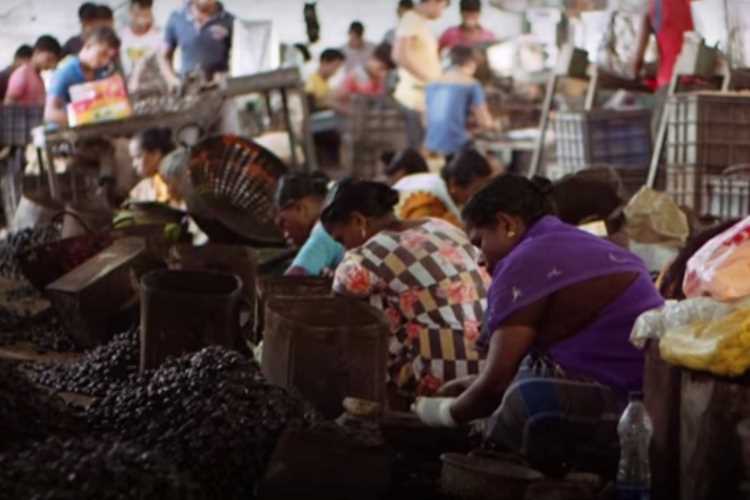
By Parashram J Patil
India is the global leader in the world cashew economy. First cashew factory in the world was set up in India. This industry is playing an important in the socio-economic development in several states. India exports cashew to more than 60 countries. Cashew is the fourth largest exportable crop in India. India has its own unique identity in the world cashew economy because of its share in the world cashew market. It has tremendous export potential. India has maintained a long-standing monopolistic position as the largest cashew kernel supplier.
India is the leading cashew kernels exporter in the world and it generates Rs 5,500 core in foreign exchange. Recently there are fluctuations in cashew trade due to the strong completion from African and Latin American countries. Though, India is one of largest cashew producing countries in the world, domestic raw cashew production is not sufficient to meet the demand of processing units and hence they have to import raw cashew. Import duty had been reduced from 5% to 2.5% so that the processing units get enough raw materials at cheaper prices. Imported cashew is cheaper than the domestic cashew by Rs 27.65 per kg. Further, the Cashew Export Promotion Council of India (CEPCI) has decided to charge NIL import duty on cashew. This will drastically increase imports of raw cashew and reduce the demand for domestic cashew. This is the reason for low prices in 2019 season in the domestic cashew market.
READ I Vande Bharat Mission: Did Kerala fail its expats in Gulf countries?
India has its own brand in world cashew economy because Indian cashew has a unique taste. This unique rich taste has great demand in world market. However, using of imported raw material hampers the Indian cashew brand as it differs in taste and at the same time it is disturbing the rural cashew economy. Thus, there is a need to relook at the cashew imports and export policy which will maintain the fine balance between farmers and cashew processors.
Indian cashew business is very sensitive and complicated because 50% cashew processing units depends on imported raw material and also there is need to protect Indian brand of cashew (Indian taste) and welfare of cashew farmers. Hence, the country needs farmer-centric policies such as promoting geographical indications of cashew, value added products like cashew apple wine, juice, candy etc. At present, 90% cashew apple is wasted, resulting in loss of an alternative income source to farmers. The minimum support price for cashew should also consist of climate change expenses, labour and damage done by wild animals. For doubling farmer’s income by 2022, the country needs agriculture commodity specific policies.
READ I Anticipating Chinese retaliation for India’s FDI restrictions
In the post-COVID period, imported raw cashew may get cheaper and the cashew processing units may import more, ignoring costlier domestic raw cashew supplies. Cashew cultivation is the main source of income for millions of small and marginal farmers and women in coastal states such as Maharashtra, Goa, Karnataka and Kerala. Though Indian cashew is of much better quality than the imported cashew seeds, it needs protection through policy intervention.
- Ban on the import of raw cashew is not the solution as half of the Indian cashew processing plants are dependent on imported raw material. Hence import of raw cashew into India is imperative for the survival of the industry. Considering the interest of domestic farmers, there must be a threshold price limit of Rs 125 per kg on imported raw cashew, below which import should not be allowed.
- Ample care must be taken to ensure that cashew exports are not hampered as there is tough competition from various countries. Exports influence domestic prices; hence healthy cashew exports are beneficial for both farmers as well as the processors.
READ I Electric vehicles: India on Mission Catch-up against odds
- The difference between the purchase price of Cashew nuts and the threshold price of Rs 125 per kg should be subsidised by state governments so as to make agriculture sustainable. The Goa government is paying a subsidy of Rs 20,000 to Rs 25,000 per tonne to cashew farmers, but other states are not offering any help.
- Although India is the leader in the world cashew economy, the industry depends on imported raw cashew for processing. The suitable agroclimatic conditions for cashew cultivation in India offer huge scope for further cultivation. Cashew nuts bring in huge foreign exchange when exported and form the back-bone of the rural economy of India’s coastal states. Therefore, it should come into the Atmanirbhar Bharat scheme, announced by Prime Minister Narendra Modi. Further efforts are needed to increase the competitiveness of Indian cashew economy in the long-run.
- Promoting Geographical Indications of cashew, value-added products like cashew apple wine, juice, candy etc.
Smooth growth of the cashew nut industry is crucial as it provides livelihood to millions of people in rural area. It has backward linkages, providing employment and supports entrepreneurship in rural areas. It also has forward linkages through exports, earning valuable foreign exchange. In the world cashew economy, India has a strong brand identity that needs to be preserved through government intervention.
(Dr Parashram J Patil is an agricultural export policy consultant with the Ministry of Commerce and Industry. The views are personal.)
